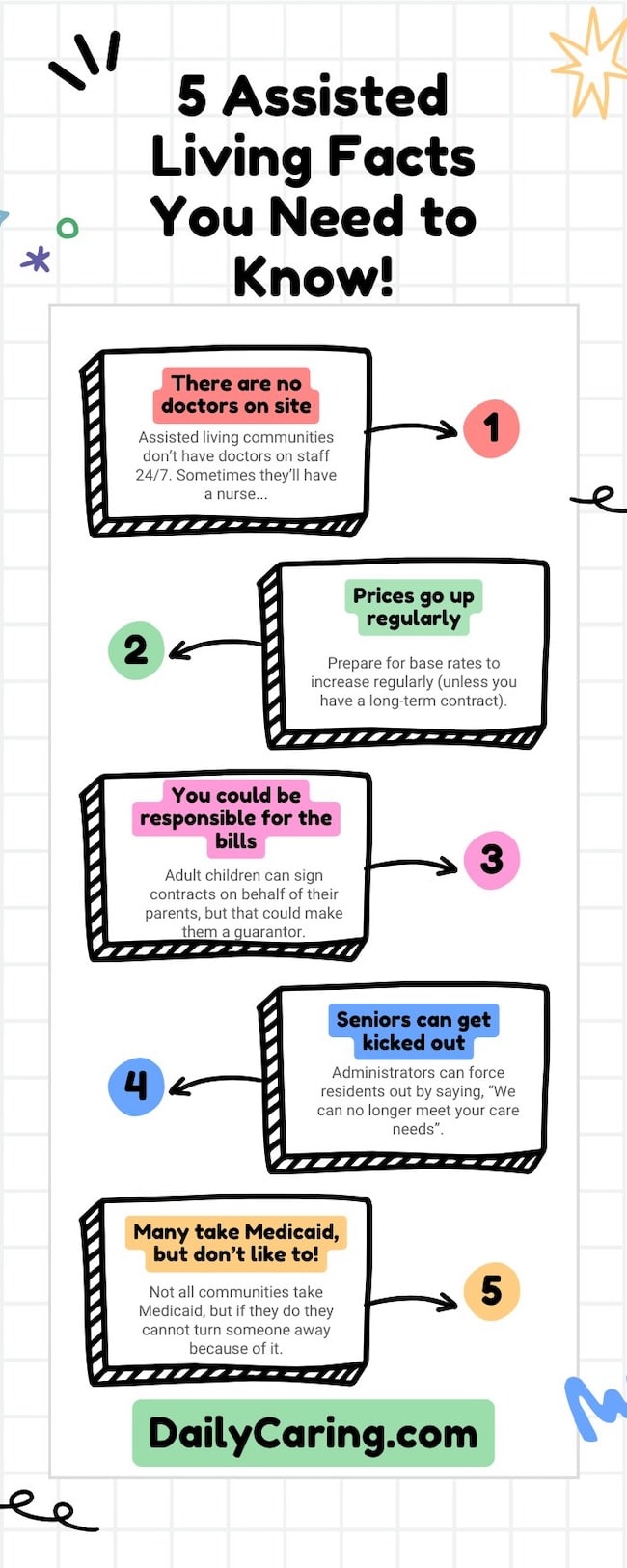Many families have misconceptions about assisted living for an aging loved one that can cloud their decision-making. While you may picture sterile facilities or loss of independence, today's senior living communities often surprise families with their vibrant lifestyles and personalized care.

This article reveals five little-known facts about modern assisted living, from unexpected amenities to financial options. These eye-opening insights will help you make more informed choices about your loved one's future with greater confidence and clarity.
5 Essential Assisted Living Facts You Need to Know
Choosing an assisted living community for your older adult is a big commitment.
Out of all the factors to consider, there are some things you need to know before signing any contracts – things they won’t tell you during the tour.
We got the scoop from an insightful article by the New York Post. Even though the article was written a while ago, the information is still spot on.
The article covers 10 things that assisted living communities won’t tell you.
We highlight the 5 top assisted living facts you probably don't know, so you won’t get blindsided by unmet expectations, extra fees, or surprise financial responsibility.
1. There Are No Doctors On Site
- Assisted living communities don’t have doctors on staff. Some may have registered nurses, but it’s not common.
- Nursing homes usually have a medical director who supervises the nursing staff, but the doctor is on call only and not physically present at the location.
2. Prices Go Up Regularly (and fees get tacked on)
- Prepare for base rates to increase yearly due to inflation.
- Many communities charge extra fees or services à la carte. This could mean additional charges for medication management, meal delivery for those who don’t visit the dining hall, or local transportation.
- Read contracts carefully, ask for details on what to expect in the future, and always ask if there are any other fees they haven’t already told you about.
- Don’t be afraid to negotiate! If you ask before signing any contracts, you might be able to get some price breaks.
3. You Could Be Responsible For The Bills
- Adult children may sign the community’s contracts on behalf of their parents, but doing so may make them guarantors—the persons responsible for making payments. You could be forced to pay if the parent runs out of money and doesn’t pay.
- To prevent this, sign the older adult’s name as the responsible party on the contract and add “by [name of agent] acting as power of attorney” and the date (advice from Bradley J. Frigon, Certified Elder Law Attorney and Past President of NAELA).
4. Residents Can Get Kicked Out Anytime
- Communities have a lot of say over who is allowed to live there. They can ask residents to leave by saying, “We can no longer meet your needs.”
- Check contracts to understand the conditions under which people could be asked to leave. Common reasons are behavioral issues or care needs that exceed the community’s capabilities.
5. Many Take Medicaid, But They Don’t Like to
- Not all communities accept Medicaid, but if they do, they can’t turn people down because they’re using Medicaid.
- FYI, communities receive less Medicaid funding than residents who pay out of pocket.
- Communities usually allocate only a limited number of beds to Medicaid enrollees, so they may say there are no Medicaid beds available.
- When an existing resident warns that they’ll be Medicaid-eligible in 3 months, it's harder for the community to use the excuse of “not having an eligible Medicaid bed available” for them.
VIDEO: 5 Assisted Living Facts You Need to Know
INFOGRAPHIC: 5 Assisted Living Facts You Need to Know

Final Thoughts
Understanding these key aspects of assisted living empowers you to move forward with confidence and clarity. While the decision is significant, remember that choosing a community is about adding layers of support, safety, and social connection to your loved one's life.
By focusing on their specific needs and asking the right questions, you can find a welcoming environment where they can not only maintain their independence but truly thrive.
Taking this informed step is a profound act of love, ensuring their well-being and your own peace of mind for the years to come.
Recommended for you:
- How to Choose an Assisted Living Facility: Helpful Checklist and Tips
- Does Medicare Pay for Assisted Living?
- 7 Senior Housing Options: Which One Works Best?
About the Author

Connie is the founder of DailyCaring.com and was a hands-on caregiver for her grandmother for 20 years. (Grandma made it to 101 years old!) She knows how challenging, overwhelming, and all-consuming caring for an older adult can be. She also understands the importance of support, especially in the form of practical solutions, valuable resources, and self-care tips.














Thank you for sharing this information! It is critical to recognize that assisted living is not a nursing home and that you must fully comprehend all the specifics before entering one. Keep in mind that not all assisted living facilities are the same. You may not be able to obtain a doctor on-site, but you may be able to receive a licensed nurse. Personal care services, such as washing or medicine reminders, are also paid in addition to monthly charges, and there are some significant negatives.